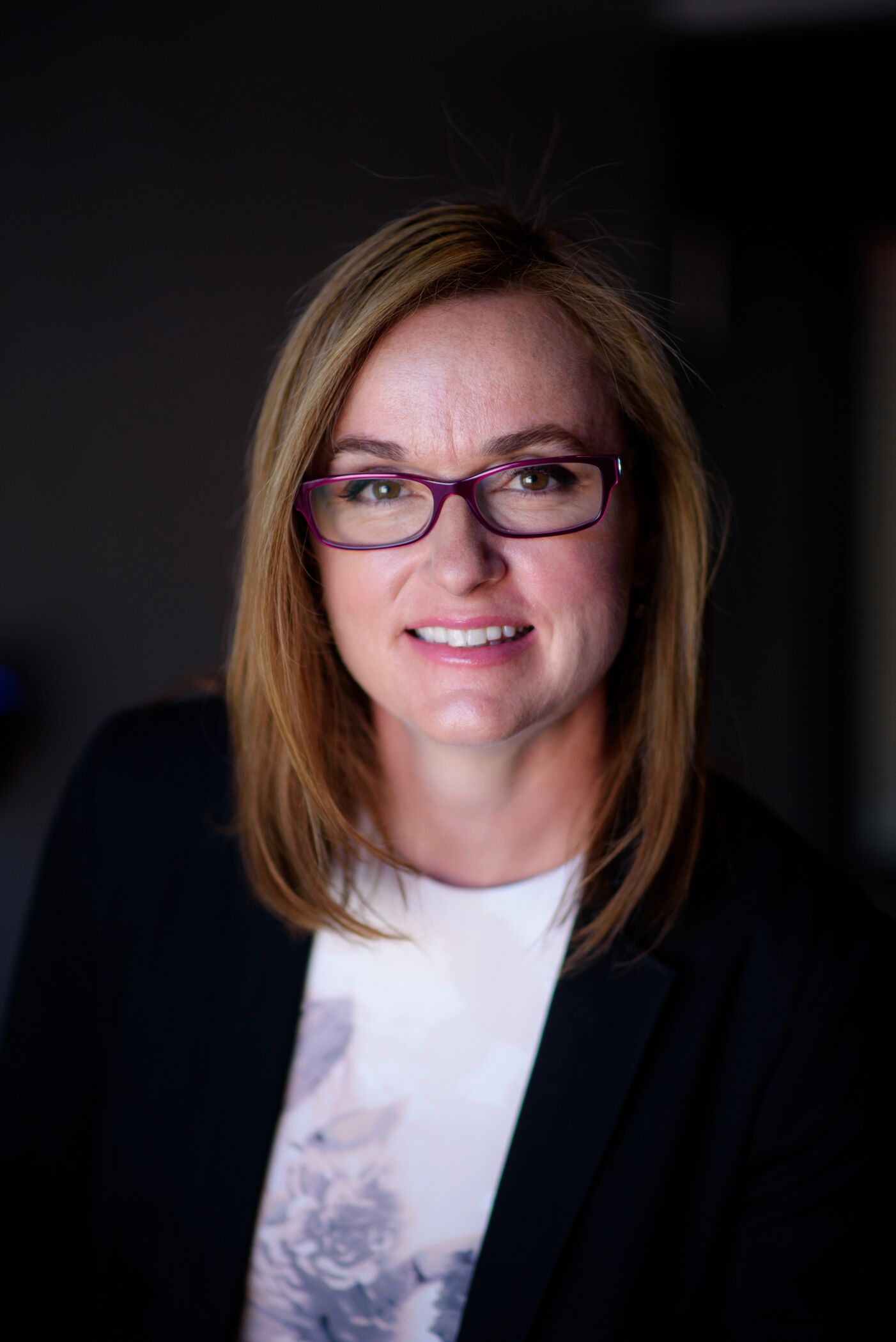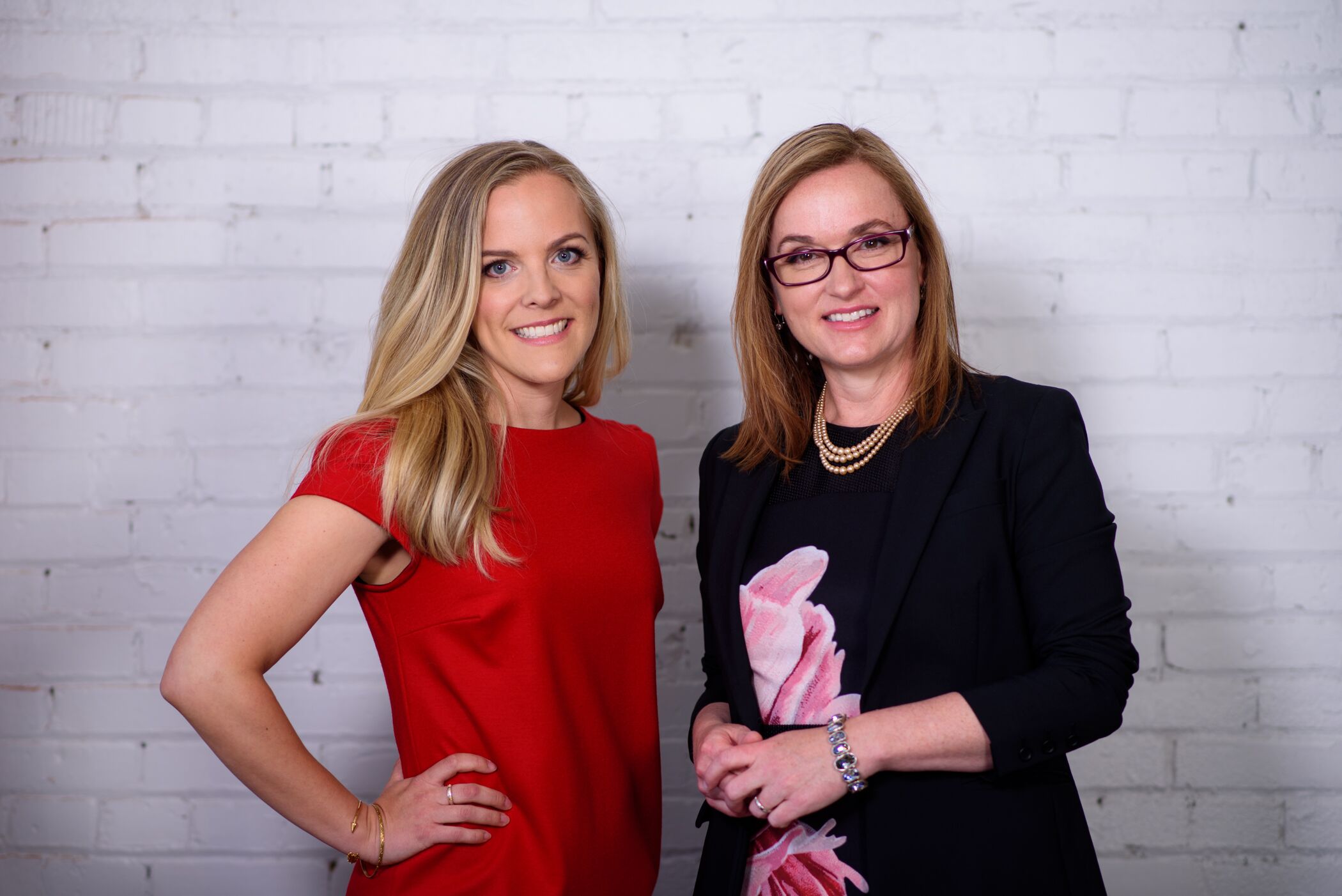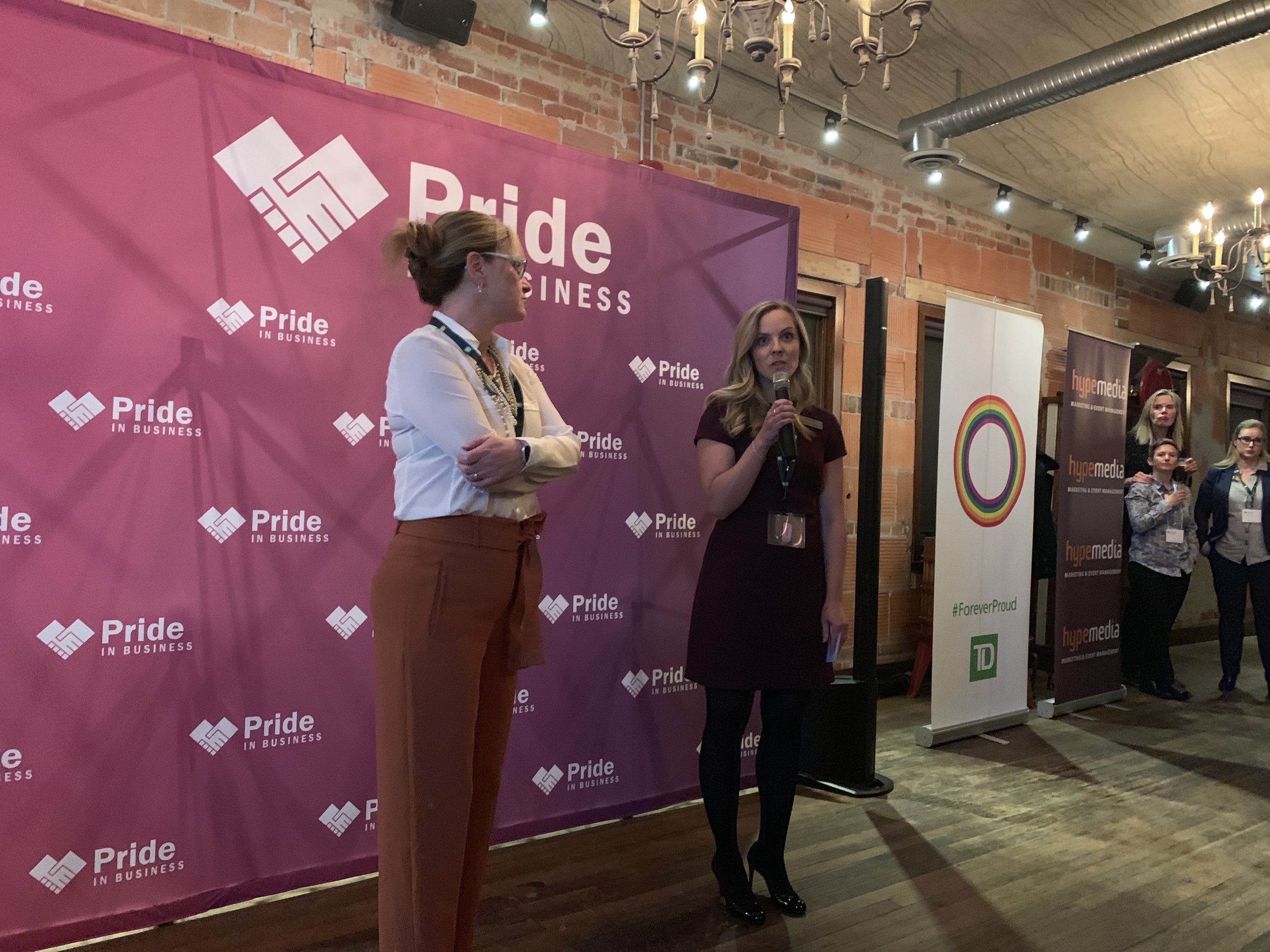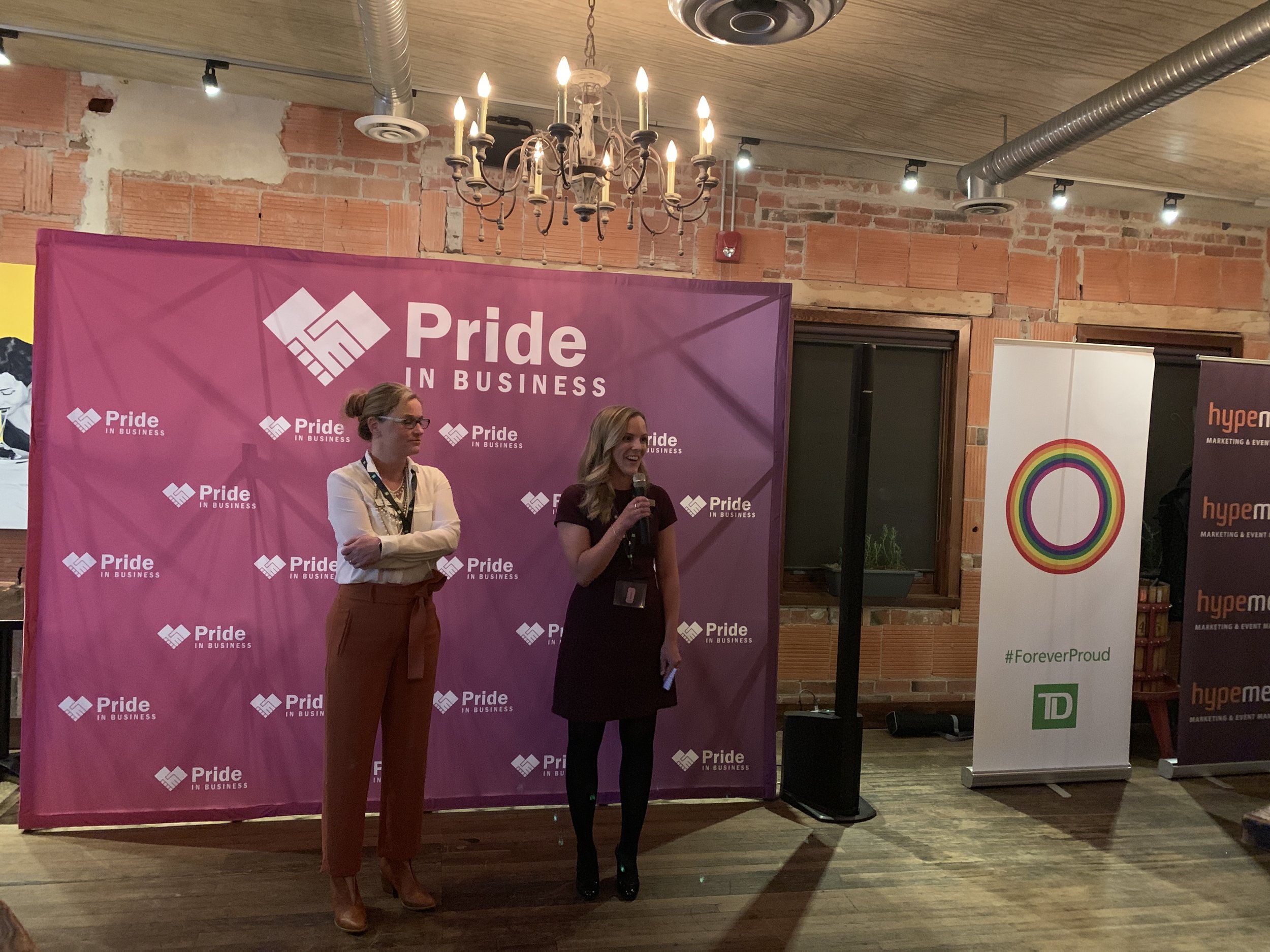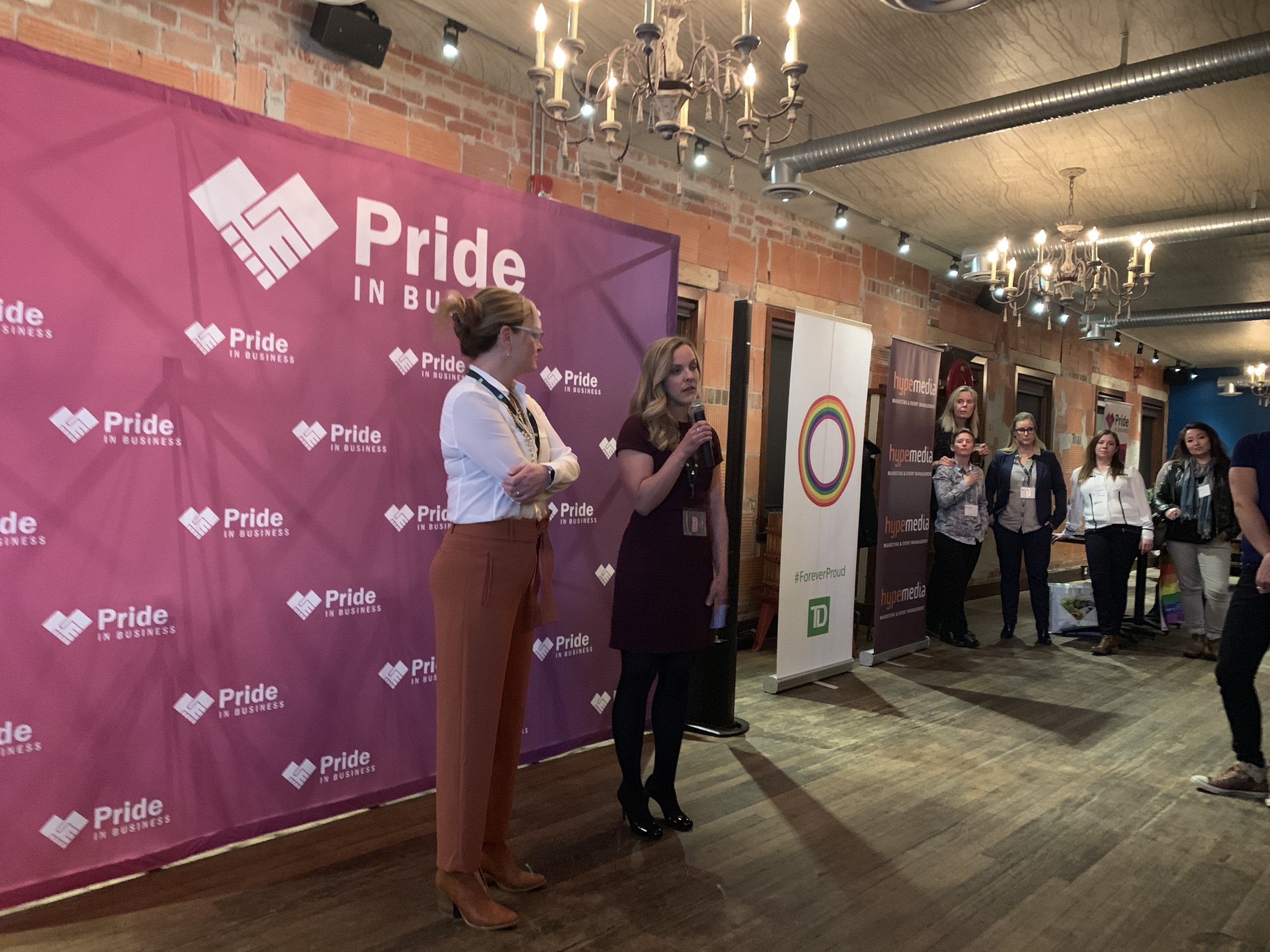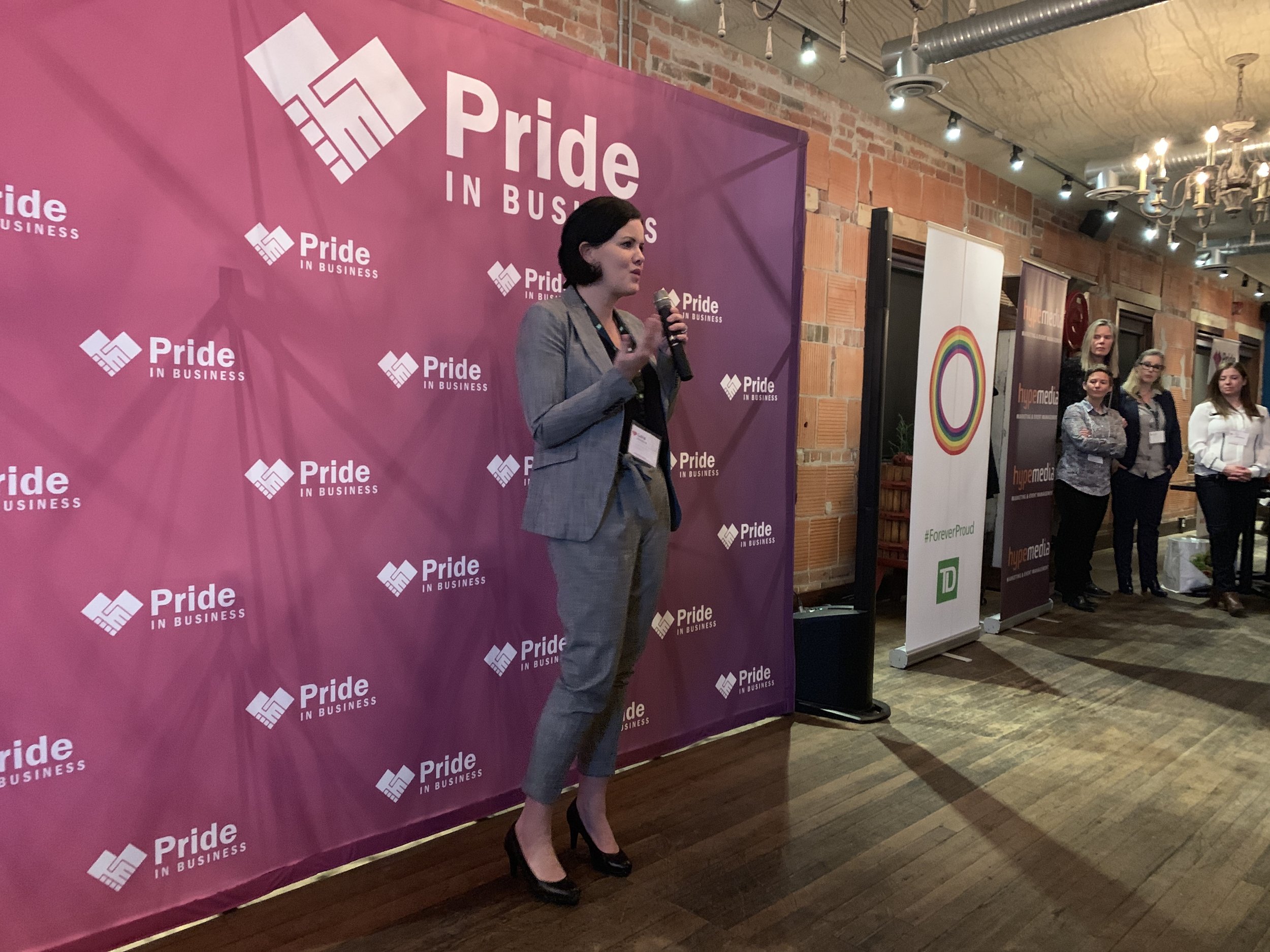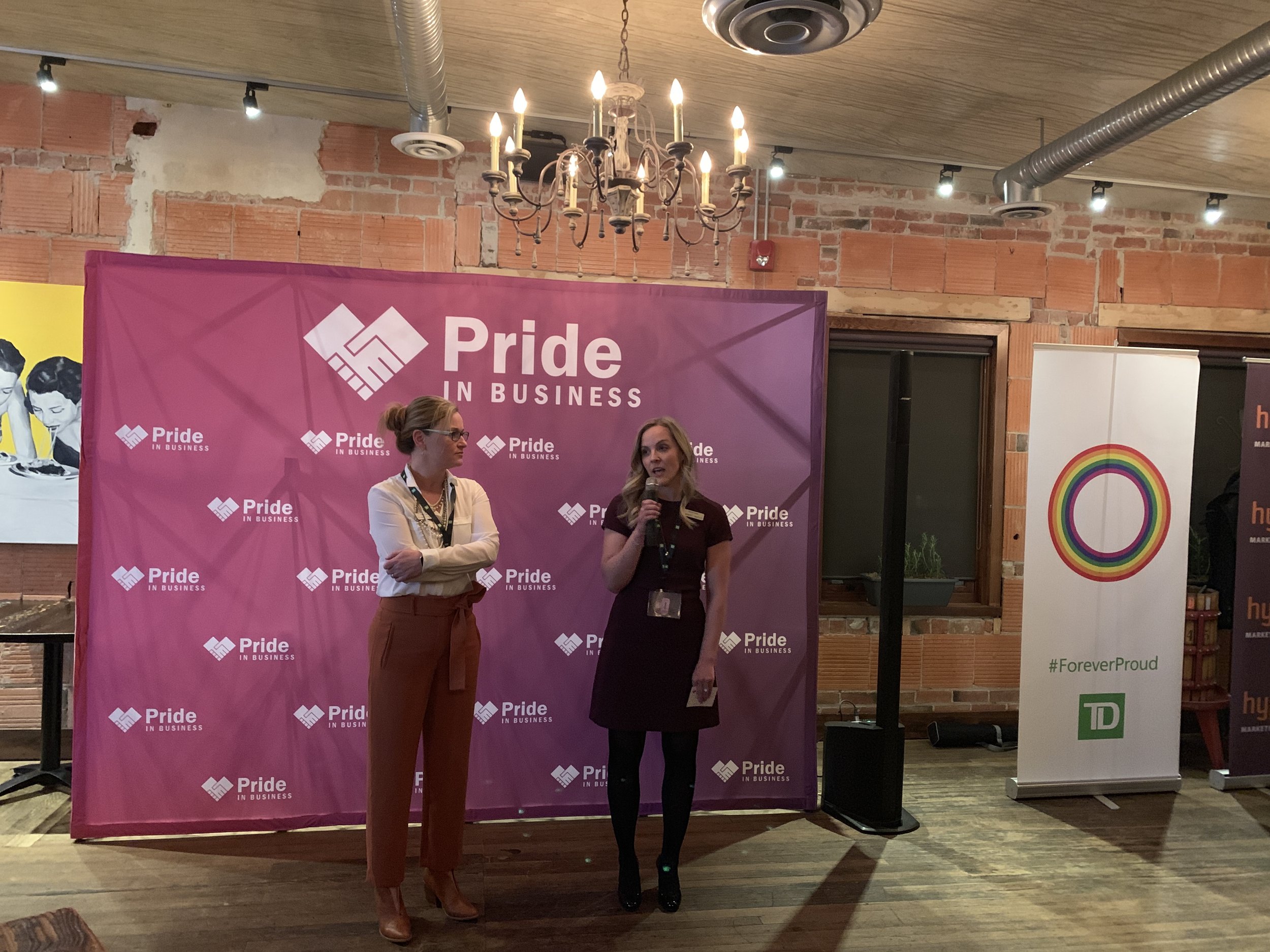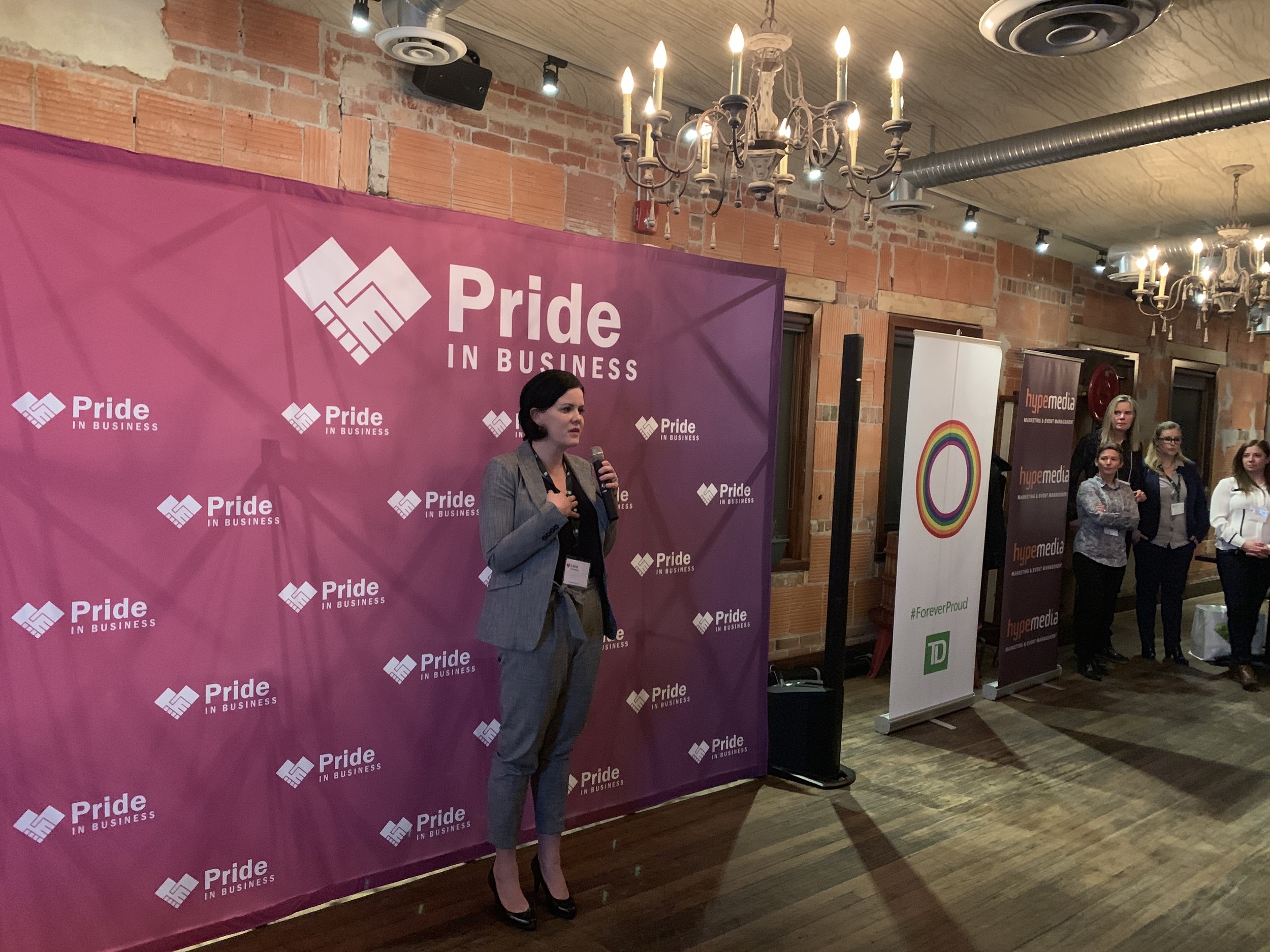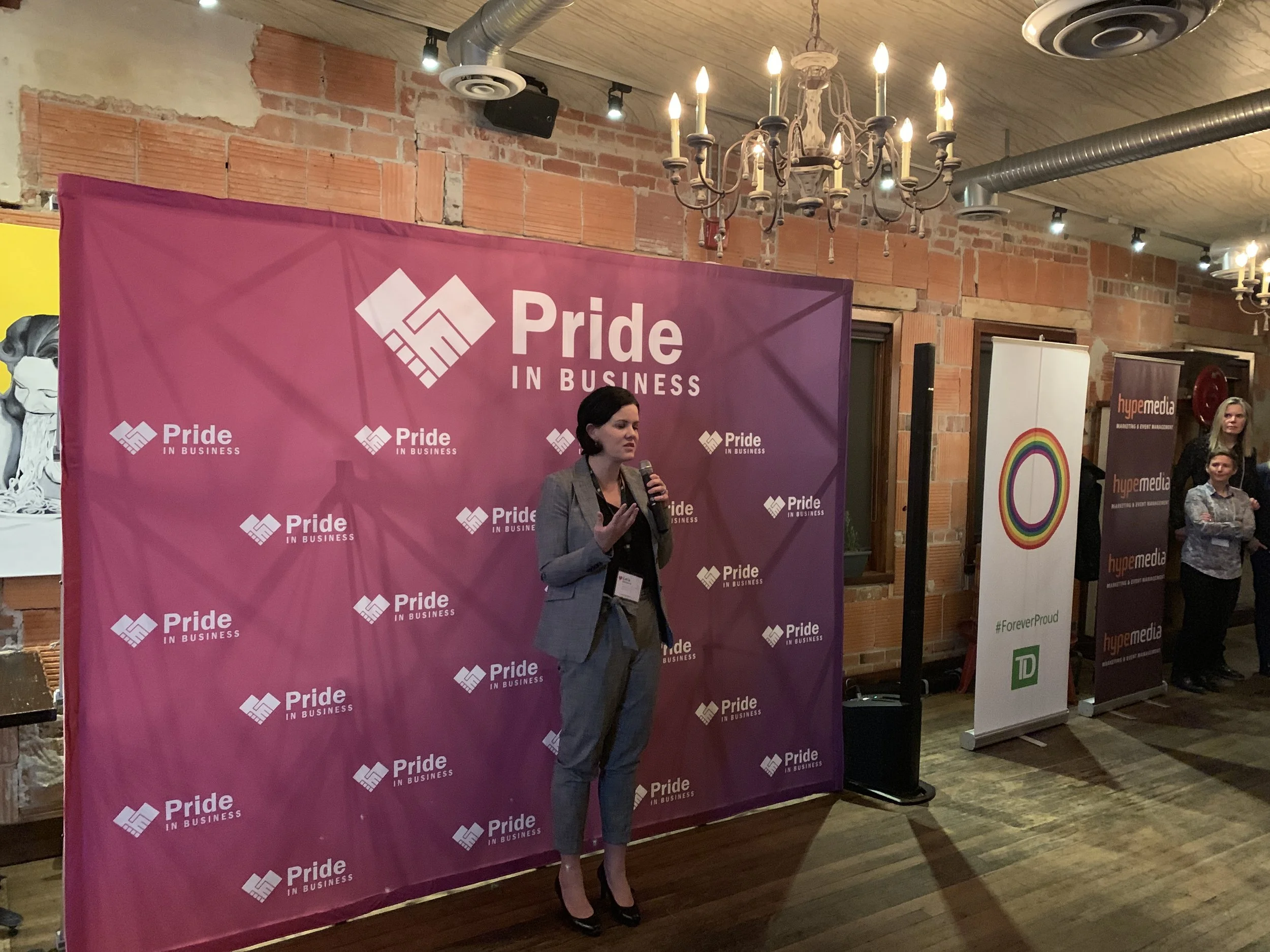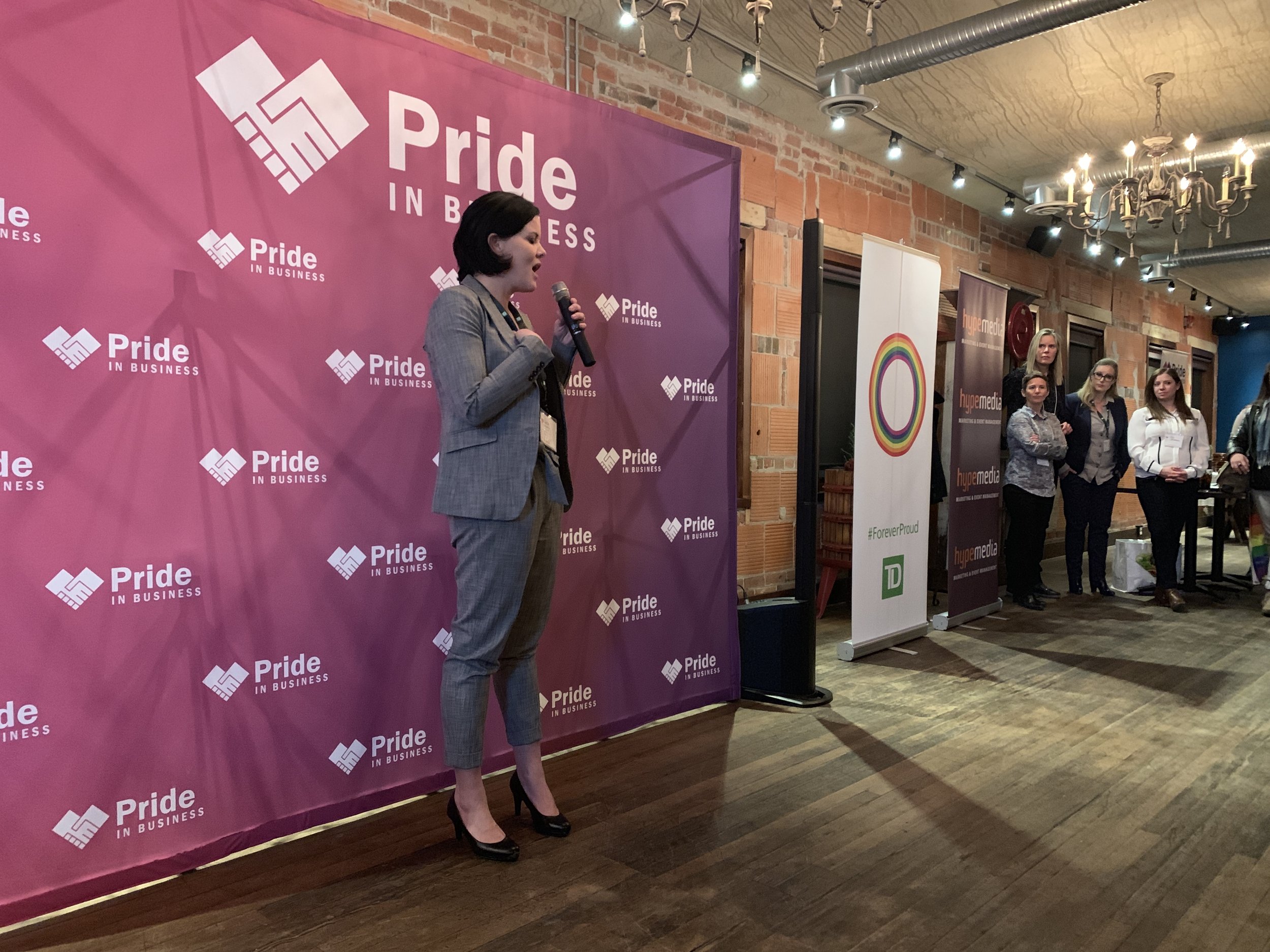Spotlight: Ellen Embury & Rachel West, Fertility & Surrogacy Lawyers
Carbert Waite LLP is a boutique litigation law firm located in downtown Calgary, Alberta, with additional expertise in estate planning and business law matters. With proven experience, they provide clients with trusted insight and innovative solutions. they are skilled advocates and advisors with experience in a wide range of legal disputes. Their approach is pragmatic, client-centred and service minded, with a view to being cost-effective.
We talk with Rachel West and Ellen Embury in this Pride In Business Community Spotlight, in partnership with TD.
Q: Tell me about yourself, Ellen?
I have been practicing law in Calgary for about 20 years. I have a husband and two teenagers, which means I get lots of time to practice law because it's hard for parents to spend time with teenagers haha. I am originally from Hamilton, Ontario and moved here about 16 years ago. We have a house in Fernie and try to get out there most weekends. We are an active outdoor family that ski, mountain bike, and do a variety of other activities. I also like to travel, which I get to do with work quite often. Rachel and I are fortunate that we have clients all around the world that are looking for surrogacy. Last year, we were in France, the UK, Spain, and Croatia. People from around the world are interested in surrogacy in Canada because it's one of two countries that gay men safely can have babies.
Q: Why do people look to Canada for surrogacy?
There are only two safe countries in the world that gay men can have babies: Canada and the United States. In much of Europe it is illegal to have surrogates, whereas in Canada there are limits but it's not illegal. Countries like Thailand, Nepal, and Mexico have been explicitly shut down to gay men. You need to be a married heterosexual couple to have a genetically related child through surrogacy in many countries outside of Canada.
Q: Tell me about yourself, Rachel?
I have been practicing law for 13 years in Calgary. I have an 8-year-old son and a 5-year-old daughter, they keep me very busy. That's largely what I spend my time doing… ferrying my children from activity to activity haha. We do quite a bit of traveling. My family has a farm back in England which parleys nicely with the traveling we do for work. I try to start my travels by spending some time with family in England.
Q: Tell me about your practice?
Ellen - I got into fertility and surrogacy law about 15 years ago, and over that time our practice has grown. Right now, we have Western Canada's largest surrogacy and fertility practice. We are delighted to help people from around the country and around the world achieve their dreams of starting a family and having a child. The majority of our clients are from the LGBTQ community. About 75% of our clients are gay men. The reality is that it's harder for gay men to take this path than same sex women partners because men need egg donors and surrogates. Most of the time women partners only need sperm, and sperm is easier to come by haha.
Q: Why do you think that you've been able to become Western Canada's largest fertility and surrogacy law practice?
Rachel - I think we have a very caring approach. Our primary goal is to break down barriers for our clients. Ellen and I are very focused on breaking down those barriers, making it an easy process for our clients, and supporting our clients throughout the process. The relationships that we've developed with our clients has allowed the practice to grow exponentially over time. The reality is, culturally and socially, as people have become more aware of surrogacy as an option, it has opened them up to the possibility to grow their own family. Through things like Facebook and online communities, people have become more comfortable with the idea. There's also a wider awareness now that people don't need to go to the United States to do this. It is available in Canada. There is an incorrect perception that surrogacy is illegal in Canada. What is illegal is paid, ‘for-profit’ surrogacy. There are hundreds and hundreds of women who are eager and thrilled to carry a child for a gay couple. There are about 8 surrogacy agencies operating in Canada right now that will work to match a couple with willing surrogates.
Q: What services do you offer a client that is looking for surrogacy? How do you help?
Usually it starts with a phone call asking, “how do I do this?”, “where do I do this?”, “can I do this in Canada”, etc. We will start out with a consultation to answer the pertinent questions. Then we will set up introductions to an egg donor agency and a surrogacy agency so they can understand how those parties work. Based on the situation, we may set up introductions to a fertility clinic. We will give clients their options, so they understand these are the 3 areas to focus on (see below). Then we try to act as a quarter back to guide them through the process. After they select their donor, we will set up a legal contract. We will also look at contracts put forward by the fertility clinics. Then, in a perfect world, they will get pregnant right away. We will then support them through the pregnancy if there are any issues. Once there is a birth, we get involved again as lawyers to ensure the birth certificate reflects the two dads and the fact that the surrogate is not a parent.
The easiest way to think of surrogacy is to break it down into three steps: 1) Creating embryos, whether that is using a donors, a friend’s eggs, etc. 2) Finding your surrogate and creating that legal contract with your surrogate, then performing the transfer with your surrogate. 3) What happens after the child is born and how do you get the parentage reflected on the birth documents. It's actually a very simple process throughout Canada. There is a perception you are going to have to adopt your child, that is not the case. In Alberta, we have a simple process where the Dads can be on the birth certificate within 7-14 days of the birth.
Q: What is the most important message you want to get across?
What we really try to do is be a huge support for our clients. We understand that this is a really scary process, and there is a feeling of “we are not in control of this situation”. The number one question we get is “what happens if the surrogate changes their mind and wants to keep the baby?”. Our job is to offer reassurance that we have never seen that in Canada and I genuinely don't believe that there is any judge in Alberta that would award custody to a woman that has entered into a surrogacy contract at the very beginning and is not genetically related to the child. Largely, what we try to do is make the process simple and not scary for our clients. We make sure there is never a point where the clients are thinking “what do we do next?” or that there is never a point that they are not protected under the law.
We would also highlight that because this is a complicated process that people are not particularly familiar with, we make a point of having a consultation initially without charging the client, to talk them through the process. We will spend generally a half hour going through their questions and giving them
the lay-of-the-land so they feel comfortable before they are committed financially to the legal fees. I understand that legal fees can feel prohibitive, so we make a point of being open for initial consultations.
Q: What made you choose your careers?
Ellen - I have always wanted to be a lawyer. I didn't envision practicing this type of law, but it has been so exciting and fulfilling. There is nothing more exciting than going to the hospital and standing with the two new dads and taking the photos. It is so, so, so wonderful.
Rachel - I started out in a clinical psychology stream which was my intended career path. When I was writing my thesis, I discovered that there were other ways of helping people resolve problems. That’s how I ended up in law. I was always interested in the human rights angle and in people. I started my career in human rights and employment law which is very people focused. Then Ellen gave me this opportunity to take problem resolution one step further from resolving conflict to proactively providing resolution for something that people are looking to do (start a family). It was a perfect fit.
Q: The work really seems to be around preventing conflict…
Our work is doing the ground work to avoid conflict. Communication is the number one thing that we deal with. A surrogacy contract is very detailed. There is lots of discussion about what the communication between parties is going to look like. We are trying to set a road map for a relationship. It’s almost like a "prenup". Our job is to think of things that our client has not thought of and to then discuss those things with their surrogate or with each other, so they feel comfortable that they have examined all the things that may happen. A classic example: what happens if both clients die in the process? That is typically something that is not considered because everyone is focused on the happy aspects of the event. Our job is to protect our clients and to think of all of the “what-if's”.
Q: What percentage of your work is fertility and surrogacy related?
On a year-round average I'd say about 70% of our time is spend with surrogacy and fertility. We tend to have something in the range of 5-6 surrogacy babies a month in our practice, all over Alberta. Some months are busy, for example in March we had 22 babies born.
Q: How do you feel your business contributes to the LGBTQ community in Calgary?
Ellen - I think that we provide hope, a clear path, and we try to minimize the barriers to the LGBTQ community having children whether they chose to have biologically related children or whether they chose to use donated embryos, we are able to walk them through what it will look like legally.
Rachel - It's all about providing choice. It's breaking down barriers and limits. Now there is another avenue to form a family that may not have otherwise been possible or within your knowledge base previously. Now you have another option, so it's not just adoption, or not just finding a friend or family member. We are breaking down barriers to increase choice and options so people can create whatever family, however they choose to do so.
Sometimes the question is asked "why can't you just adopt"? Adoption is an incredible, beautiful, wonderful thing… but there simply aren't that many healthy newborn babies available for adoption. The reality is that young women are learning about sex-ed in high school and being more cautious and looking after their own bodies and themselves. As a result of that, it is very difficult to adopt. I have clients who have spent 6-7 years on adoption waiting lists. They are shocked when I tell them that they can potentially have a new born which is genetically related to one of them, if that is their wish, within about 18 months.
Adoption has its own barriers and burdens. The wait is substantial. Particularly when young professionals are coming to the idea of having a family, the idea of adding an additional 6-7 years to that timeline feels very prohibitive. This allows more choice, less limits. Adoption can be very difficult to jump through the required hoops and wait that long, when it is something that you desperately want. It is freeing to know there are other options available for you.
Q: Can you give an ear mark for how much it generally costs to go through fertility?
We typically advise clients that they should expect, assuming they need an egg donor, a surrogate, and they are using a clinic in Canada, that the whole process front-to-end costs in the range of ~$80k CAD. I often tell people that lawyers are the least expensive part of the whole process haha. Obviously, it will cost less if the client doesn't require an agency to find a surrogate. Some people may have a friend, or a family member prepared to carry for them and another friend or family member who is willing to donate eggs. In this situation, the costs go down significantly because you eliminate agency fees. One of the things that we are lobbying for in Alberta is for a program similar to a program in Ontario, and what they are actively discussing in British Colombia, is government funding for IVF. Our understanding is the Alberta government is looking at it, but my impression is that it is not a priority.
Q: How can you and your business serve as a connection or a hub for connecting people in our community?
We are always happy, if the clients are happy (within the context of a legal relationship as clients are confidential), to connect them so they can go through the process together so that they can have community and support. We often find that clients are looking for other individuals in the same community who are going through the experience at the same time. If both parties are willing to disclose their names, we are more than happy to connect them. It is fun to have a social network during the process and it’s fun when you have young babies together. There are also enormous communities online that exist for intended parents and specific pockets of intended parents to support that process. We direct clients to those communities, to be a part of them, to introduce themselves so they can create their own community.
Q: Do you have any advice for LGBT community members who want to go into business for themselves similar to yourself? Are you open to being approached from members of our community would who like to connect on topics we discussed in this article?
Of course, the first step is obtaining a law degree haha. However, either one of us are more than willing to have coffee with someone who is interested in understanding the particular ins-and-outs of the areas of law. We are more than happy to talk to someone about what we do, how we do it, and how we got here.
If you go on to our website, click on request a free consult, whichever one of us answers first will be jumping on the opportunity talk to you about this area of law. We love to spread the word "you don't have to go to California and spend $150k USD to have a baby, and it's not as scary as it may seem to have a baby. It's really quite simple if you have the right people working with you".
Log on to their website for more information or to connect with either Ellen or Rachel: www.CanadaFertility.law



